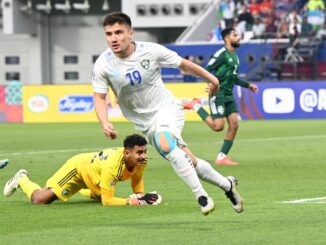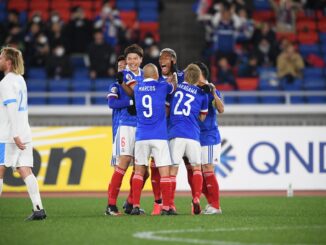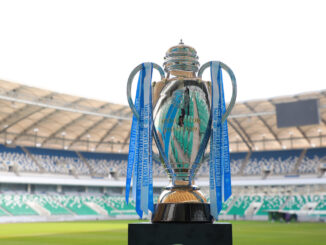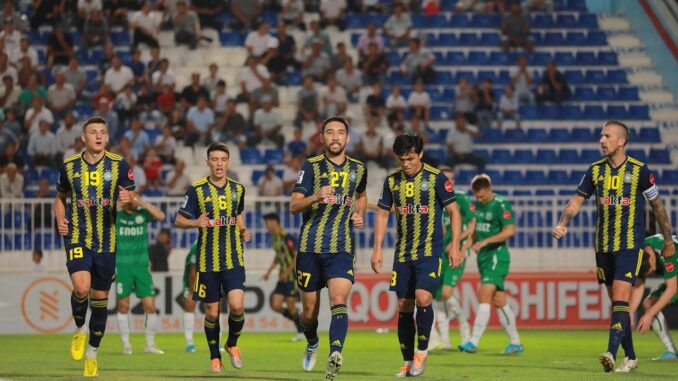
Back in March, I posed the eternal plea – could Uzbek football finally present a competitive Super League season?
I floated the question more in hope than expectancy, but as we are soon to be greeted with the final run in of the season, I, more than anyone, have been left pleasingly surprised at the high stakes drama that we have on our hands as we head into the final ten matches of the season.
Pakhtakor wobbling
Over fine months ago however, we were predicting a struggle for reigning champions Pakhatkor, and so it has materialised.
Following an early exit from the AFC Champions League group stages ahead of the domestic season, early form back home similarly saw them struggle to get out of first gear.
The pragmatism that had been forged under Pieter Huistra last year was starting to crumble under this year’s incumbent Slavche Vojneski which, coupled with a telling lack of goals, has truly held them back from really making a dent domestically over the last few months.
It’s a hangover that has rather (in)conveniently spread to the other title monopolies across the Central Asian region in the last six months.
Istiklol, eight times consecutive Tajik champions, have struggled in their title catch up following a below par ACL campaign. Altyn Asyr, eight times consecutive Turkmen champions, have started slowly in their Yokary Liga defence on the back of a weak AFC Cup campaign. While Dordoi, four times consecutive Kyrgyz champions, are a mammoth 14 points behind top spot domestically.
The common theme has been a change of personnel and coaching staff, alongside the struggle to successfully juggle continental commitments with domestic performance. A tale keenly felt in Tashkent also.
The title challenge rises as one
In reaction to Pakhtakor’s wobbles, the supporting cast in Uzbekistan have suddenly started to resemble a competitive alternative to the Cotton Pickers’ long term domestic domination.
First demonstrated through the gung-ho approach of Qiziqulm, who broke from an Uzbek staple of keeping it tight and playing the percentages, the Zarafshon-based club opened up and impressed on the counter right from the start; capped off by the early season form of attacking pairing Temurkhuja Abdukholiqov and Aleksandar Stanisavljević.
Qiziqulm’s early pacesetting dragged the rest of the field with them. Fresh off the back of their progression to the knockout stages of the ACL, Nasaf Qarshi are growing of age; their young side finally living up to their hype, playing attractive football (as they’ve done for years if we’re honest) but now delivering an end product through mobile front man Khusayin Norchaev and creative outlet Oybek Bozorov.
Unfulfilled promises are a regular theme across Uzbekistan football in recent years, and like buses, others arrived to join the race at the top, at the expense of a stuttering Pakhtakor.
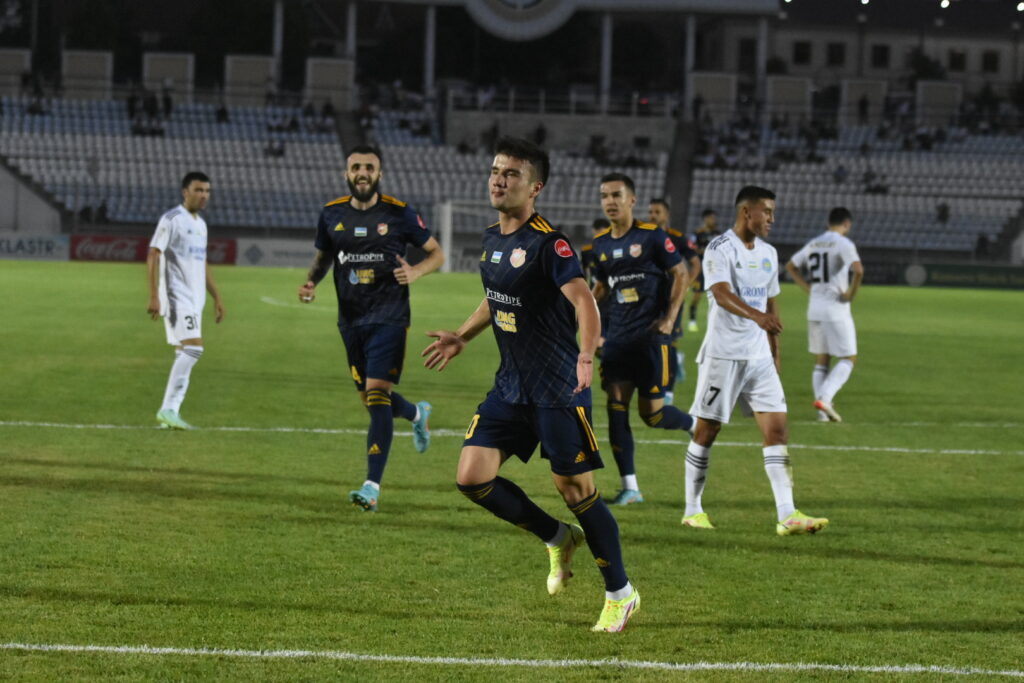
Sogdiana, proving last season’s top four finish was no fluke, continued with a broadly stern defensive approach, but this year have added goals through surprise golden boot contender Shokhruz Norkhonov.
But it was Navbahor Namangan, the romantic anti-establishment alternative to the glamour of Tashkent-turned comparative big spenders, that were ready and primed to be the newest challenger to Pakhtakor’s crown.
While it must be accepted that their chances were inflated ahead of the season, reality in the shape of a rather functional Samvel Babayan-led team, no matter the talent found within it, ultimately brought an expectant audience down to earth early on.
While their progress has been more methodical than glittering, in comparison to early pacesetters Qizilqum, the first half of the season was undeniably successful; topping the table at the summer break and starting to grow as a team out of an extensively assembled array of individual talent.
Former national team starlet Jamshid Iskanderov has arguably been the league’s top performer to date, demonstrating the type of form that made him a firm favourite elsewhere in Asia during his time in the K League.
Instead of resting on their laurels, Navbahor have gone further this summer, bringing in Jasurbek Yakhshiboev in the off season, following a brief but ultimately successful stint in Europe with Sheriff Tiraspol that took in a Champions League victory over Real Madrid at the Bernabéu no less.
The addition of “the Yak” into the attacking formation adds another tool in Babayan’s arsenal, to a side that’s starting to find their sparkle to complement some highly consistent form, having not lost since late April.
Maksim Shatskikh steps into the fire
Pakhtakor then are looked to for a response; an unfamiliar ask for a club that has either flown away with the league by this point or ground out a large enough lead in spite of weak competition around them in recent years.
Slavche Vojneski’s days as coach met an inevitable end at the summer break, without a credible and obvious option internally to replace him at the helm.
They instead turn to a footballing legend within Uzbekistan, a man whom progressed the nation’s footballing capacity for decades, yet one with no head coach experience to call upon.
Instead a firm respect from within media circles and the character demanded to redress the growingly chaotic organisation within the club is seen as the perfect fit for the current situation.
Maksim Shatskikh, the former Dynamo Kyiv and national team striker turned footballing administrator, a mere few weeks before being offered the head coaching role, has been quick to win over the fans with his no-nonsense approach to modern football; a broad back-to-basics message that has regularly been the go-to defensive solution to Uzbek football difficulties for decades.
His immediate impact has been solid if not revolutionary; aided by the arrival of a brand-new centre back pairing of Ilija Martinović and Oleksandr Nasonov, in addition to what many have been crying out for years now – a credible option to support leading man Dragon Ceran in front of goal – in the form of Polish striker Przemysław Banaszak.
The new manager bounce has probably not had as demonstrable impact on proceedings as one would’ve hoped just yet, but optimism and feeling around the club has noticeably shot up a notch or two, with Shatskikh prowling the touchline in an aura that emulates a certain Eric Cantona with a turned-up collar for good measure.
For weeks now the top four have replicated one another step-for-step and strangely fall for fall. Following four wins from four last week, no wins were recorded in midweek, adding to the regular conundrum posed in the media asking if anyone really wants to win this year’s title.
Heading into the final ten matches of the season the top four are separated by only two points, with Qiziqulm, who despite blowing up early after a lightning start, are now clawing their way back into it, a further point back in fifth.
Coaching changes reignite the relegation dogfight
An accompanying tale to the enthralling race at the top, is the significant improvement of the bottom half.
The Uzbek U23 team that made the final at the U23 Asian Cup in June have a lot to thank the inclusion of the Olympic team by the same name, who have grown from strength to strength this season, from relegation battlers to outside shouts of a top half push.
Manager Timur Kapadze has primed a fit and firing outfit capable of not only providing a headache or two to those around them, but demonstrably influencing the title fight as we draw to a close; snatching a point from Pakhtakor in the last week.
Elsewhere, managerial changes at the bottom shake things up in the fight to avoid the drop.
Former Istiklol coach Vitaly Levchenko who has joined Neftchi, currently sitting in the danger zone, is joined by two of his defensive trio that brought continental success to him during his time in Tajikistan to reform some solidity.
Fresh off the back of a productive U23 Asian Cup Ulugbek Khoshimov offers the required threat at the other end in their bid for survival.
Arguably cut adrift at the half way mark, Dinamo Samarqand have made a decent fist of assembling a squad to turn around their six-point deficit; maverick former national team coach Vadim Abramov takes on his first job since his World Cup qualification collapse, joined by the experienced duo of Marat Bikmaev and Elguja Grigalashvili who have already made a positive impact, without finding that winning feeling just yet.
At this point, you’ll not be surprised by the lack of mention for the Tashkent duo of Lokomotiv and Bunyodkor, who despite an illustrious recent past have suffered another year of rebuild and frustration.
The summer signing of Jasurbek Jaloliddinov, a player who, despite starring at the U23s, has plenty to prove domestically, neatly summing up where both clubs are and where their eyes will start wandering to as we wind down the season.
An interesting culmination to the end of the season at both ends, crucially with a promise of more to come. Despite a few years of stagnation on the continent, their success in the AFC Cup, firstly with Nasaf’s run to the final last year and Sogdiana’s presence this term, Uzbekistan are due an inflated number of slots for the reformatted AFC Champions League campaign in 2022/23.
A year is a long time in football. Emerging from the darkness, the sun is starting to shine brightly on a wonderfully poised Uzbek Super League title race.
Photo: twitter/Pakhtakor_fc
Listen to Episode 90 of The Asian Game Podcast as we preview the knockout rounds of the AFC Champions League (East Zone)


